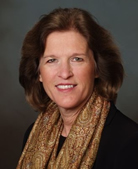5 Questions With Claudia Grauf-Grounds
Posted By Barry Jacobs, Tuesday, June 19, 2012
Barry J. Jacobs: I had the privilege recently of conducting a phone interviewwith Claudia Grauf-Grounds, Ph.D., a long-time acquaintance from the CFHA andSociety of Teachers of Family Medicine (STFM) conferences. For two decades, shehas been an exemplar of the collaborative care champion who has gracefullystraddled the family therapy and family medicine worlds, teaching trainees fromeach about the culture of the other. In workshops and at meetings, I have alwaysbeen impressed by Claudia’s equanimity and good cheer. Perhaps this reflects herself-assurance about her missions as an educator and clinician, as well as herdeep and abiding spirituality.
1: What experiences in your professional or personal life were most influentialin your development as a medical family therapist?
In terms of my professional development, I was teaching family therapy at theUniversity of San Diego in the early-‘90s when JoEllen Patterson asked me toapply for a part-time behavioral faculty position at Sharp, a newcommunity-based, family medicine program that was being started by familymedicine leader Joe Scherger. After I was hired, along with psychiatrist SteveGroban, we had to figure out what to do. We started going to the STFM Family inFamily Medicine conferences, held each year for many years at Amelia Island,Florida, where I met the gang—Jeri Hepworth, Tom Campbell, Susan McDaniel, DaveSeaburn, Alan Lorenz. All of these were very competent professionals andwonderful people who wanted to address families and suffering but could alsotalk in the same paragraph about their own families. They were all mentoring me.I met Tina Schermer Sellers at Amelia Island at the same time I was applying formy current position at Seattle Pacific University. I shared her vision to workwith families and illness and we hit it off. Tina had worked for years as afamily therapist in oncology and she had had the idea independent of me to starta certificate program in MedFT at SPU. In 2001, we started a MedFT certificateprogram for our masters and post-masters family therapy programs.
The personal experience that has informed my career was that my son was bornwith transposition of the greater heart vessels that meant there were noconnections between his lungs, heart and body. He was suffocating at birth.During his two open heart operations and subsequent hospitalization, my husbandand I basically lived at the Children’s Hospital in San Diego. We coped not onlybecause of the amazing hospital professionals who supported us but also becauseof our faith community at that time. That experience has led me to think a lotabout internal and external resources of healing. That’s how I train my studentsand work with my clients—evaluating the kinds of internal and external resourcesthat clients use. My son, by the way, is now 23 and is doing great. Hisinternist at University of Washington wrote about him in an academic journalbecause he is the only person with that congenital cardiac condition who laterwent on to compete in Division II track.
2: What do you consider your most important contribution to the MedFT field?
In my role as department chair, I’ve been able to facilitate Tina’s dream tostart a university-based MedFT certificate—one that isn’t affiliated with onehospital or residency program. Instead, we put students in multiple healthcaresettings where they get an overall picture of how families can be involved inmedical care. But we also ask each student to focus during training on oneillness—fibromyalgia, cancer, diabetes, etc.
I’ve also worked to expand George Engels’ biopsychosocial model to one that isbiopsychosocial-spiritual by presenting consistently at CFHA and STFMconferences on spirituality and by collaborating with other trainers on thistopic and by introducing a core course on Spirituality & Health in our MedFTcourse curriculum.
3: What do you think MedFT, as a field/orientation, needs in order to move intomainstream healthcare?
I think there are situations now that prompt people to think about their ownfamilies and illness situations—e.g., dealing with aging parents, woundedwarriors in military families. People understand intuitively that it’s importantfor healthcare to be family-based. But we’re still using a fee-for-service,individually oriented reimbursement model. Families want to be engaged inhealthcare but realize that they will have to pay for it out of pocket. Ourfield must advocate for a more family-based reimbursement system.
4: What do you think our training models lack that puts us behind some otherfields?
I like the hubs of MedFT training that I’m seeing in different contexts. Thedifference is that we’re still an interdisciplinary group and interdisciplinarygroups have difficult getting traction politically. Things like writing blogswill help us because that’s where real people live.
5: Ideally, where would you like to see MedFT in the next 10 years?
NAMI is an integrated whole of families and healthcare professionals devoted torelieving the suffering of families dealing with psychiatric illnesses. I’d lovefor MedFT to become a kind of professional NAMI—a go-to field that demonstratesthe value of working with families with all illnesses and advocates for thosefamilies. Claudia Grauf-Grounds, Ph.D. is Chair and Professor of the Department ofMarriage and Family Therapy in the School of Psychology of Seattle PacificUniversity. For many years, she also supervised the behavioral science trainingof family medicine residents at the University of Washington. She is theco-author of Essential Skills in Family Therapy: From the First Interview toTermination (Second Edition) (Guilford, 2009) and has also published extensivelyon MedFT training, couples treatment, anticipatory loss and spirituality inFamilies, Systems & Health and other journals. She and her husband, a pastor,have three adult children (ages 23-30) and an 18-year-old dog named CoffeeGrounds.
Claudia Grauf-Grounds, Ph.D. is Chair and Professor of the Department ofMarriage and Family Therapy in the School of Psychology of Seattle PacificUniversity. For many years, she also supervised the behavioral science trainingof family medicine residents at the University of Washington. She is theco-author of Essential Skills in Family Therapy: From the First Interview toTermination (Second Edition) (Guilford, 2009) and has also published extensivelyon MedFT training, couples treatment, anticipatory loss and spirituality inFamilies, Systems & Health and other journals. She and her husband, a pastor,have three adult children (ages 23-30) and an 18-year-old dog named CoffeeGrounds.


 正在提交中...
正在提交中...



